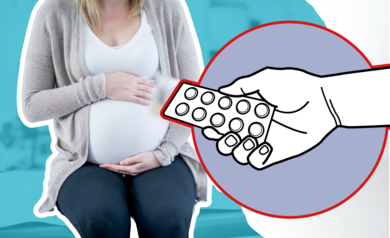- Health Conditions A-Z
- Health & Wellness
- Nutrition
- Fitness
- Health News
- Ayurveda
- Videos
- Medicine A-Z
- Parenting
- Web Stories
Chris Martin Gets Candid About Depression—Shares 5 Therapy Tricks Helping Him Feel Alive Again

Credits: Wikimedia Commons
"Lights will guide you home
And ignite your bones
And I will try to fix you"
These lyrics of "Fix You" have resonated with many in the past. Especially for when people were struggling. However, for even the brightest stars, dark days are inevitable. Chris Martin, who is the lead vocalist of Coldplay and one of the most celebrated musicians in the world also opened up about struggling with depression. In an Instagram video which was recorded after a concert in Hong Kong, Martin shared a few simple, but meaningful tools and types which have helped him navigate mental health challenges.
"We are in Hong Kong... I've noticed that some people lately, including myself, are struggling a little bit with depression. So I wanted to talk to you about some things that are helping me on tour and in life in general, in the hope that they can help you as well."
What Tools Have Helped Him?
Freeform Writing: Among the methods, he highlighted the importance of freeform writing. It is a practice where one writes continuously on paper for 12 minutes without any judgments and then discards the paper.
It is a form of expressive writing, which researchers have also found to reduce symptoms of anxiety and depression. As per a 2017 study published in Advances in Psychiatric Treatment, expressive writing can help individuals process traumatic or difficult emotions. It can also promote emotional regulation and mental clarity.
Transcendental Meditation: Martin also credited transcendental meditation or TM as transformative. It is a form of silent mantra meditation that has shown promising results even in studies too. A 2014 meta-analysis in Current Hypertension Reports found that TM can reduce psychological distress, including anxiety and depression. It is even better with consistent practice. For Martin, it has been a tool to ground himself amid the chaos of touring.
The Costello Method: He also notes proprioception, which is the sense of relative position and movement of one's own body. He pointed to the Costello Method, which was developed by Jim Costello, which is used to improve brain-body coordination, especially for those with ADHD and autism. Research on this is limited, however, proprioceptive activities in general like balancing exercises or joint compression have been found to support emotional regulation.
Breathing In And Out: Martin also highlighted the book The Oxygen Advantage by Patrick McKeown. The book emphasizes on the power of proper breathing techniques. The book also focuses on breathing exercises, especially those promoting nasal breathing and CO2 tolerance. These have shown to lower stress levels and improve resilience. Studies have also linked slow, deep breathing to lower cortisol levels and improved autonomic nervous system functions.
Music And Films For Mental Health: He also finds joy in music and films. Of course, this is something we all do, which is why so many have resonated with "Fix You". He also mentioned Music For Psychedelic Therapy by Jon Hopkins for listening and the movie Sing Sing for people to watch. He described these both as uplifting. The power was music have earlier also been well documented. In fact, a 2016 study in the Journal of Affective Disorders noted that music therapy significantly improves mood and quality of life in people with depression.
Talking About Mental Health Challenges
This is not the first time Martin has opened up about his mental health challenges. In 2014, after his divorce from Gwyneth Paltrow, he admitted that he had been facing daily struggles and depression. "There are still many days when I wake up and feel down, but this experience has given me extra tools to keep going," he told to The Sunday Times.
In 2023, his partner, actress Dakota Johnson also talked about Martin's strength at the 17th Annual Hope Luncheon. She said, "Chris has been there for me in the most difficult times. There is a gentleness in the way he supports me that I have never found before.”
For Martin, music remains his lifeline. “My head tends to be filled with negativity, and music has always been the place where I find some light and meaning,” he shared in an interview with NME. His vulnerability not only humanizes him but also offers hope and practical tools to anyone navigating mental health struggles.
Why Getting Your Covid Booster Shot This Fall Could Be Tricky?

Credits: Health and me
Most Americans are asking the same questions, "When Should I Get My Covid booster?", “Can I still get a Covid booster?” The answer, unfortunately, isn’t simple. For some, the shot may be easy to access, but for many, navigating eligibility, availability, and potential out-of-pocket costs is becoming increasingly complex. This fall, the landscape for Covid vaccination is shifting, leaving uncertainty for millions who once relied on pharmacies and clinics for routine boosters.
Part of the confusion comes from shifting FDA guidance and evolving recommendations around new mRNA formulations. Add to that state-level rules, age restrictions, and questions about insurance coverage, and you’re left with a situation where many people simply don’t know if they’re eligible—or if they should be lining up at all. Parents, especially, are finding it tough to get clear answers about vaccines for children.
Health and Human Services Secretary Robert F. Kennedy Jr., along with the Food and Drug Administration (FDA) and the National Institutes of Health (NIH), have altered longstanding guidance on who should receive vaccines, raising questions about both safety and necessity. The resulting uncertainty has prompted organizations such as the American Academy of Pediatrics to issue their own evidence-based recommendations, aiming to fill the information gap.
What Are The Challenges of Getting A Covid Booster In Fall?
What this really means is that access isn’t just about supply anymore—it’s about information, clarity, and timing. As new Covid variants continue to surface, staying on top of vaccine updates matters more than ever, but understanding the rollout may feel like a moving target.
Pharmacy Access and State Limitations
For years, most Americans have received Covid vaccines at local pharmacies. This fall, that model may face disruption. Pharmacists’ authority to vaccinate varies across states, and in at least 18 states plus Washington, D.C., this authority is tied to official guidance from the Centers for Disease Control and Prevention (CDC) or the Advisory Committee on Immunization Practices (ACIP). With Kennedy’s overhaul of the ACIP, the usual routine of a June vote on recommendations has been delayed, leaving many states scrambling to maintain access. Pharmacy groups are now requesting governors to issue executive orders to restore vaccine administration authority, but this process is slow and inconsistent.
Eligibility Hurdles for Under-65s
If the FDA limits approval to individuals 65 and older or those with specific high-risk conditions, younger adults will face hurdles. Proof of underlying conditions such as asthma, diabetes, cancer, mood disorders, or obesity may be required to qualify. Healthy individuals seeking vaccination may need off-label prescriptions from doctors, a process pharmacists generally avoid due to liability concerns. This added layer of complexity could dissuade many from receiving the booster, despite rising Covid cases.
Children, Pregnant Individuals, and Vulnerable Populations
The situation is similarly complicated for children and pregnant people. While healthy children can still receive the current vaccine through shared decision-making with parents and providers, the CDC has removed routine recommendations for certain groups. The American Academy of Pediatrics emphasizes that infants aged 6 to 23 months face risks comparable to adults in their 50s, advocating for booster access for high-risk children and any family choosing vaccination. Pediatricians routinely prescribe off-label vaccines for young children in specific scenarios, but the guidance remains less straightforward than in previous years.
A Summer Surge and New Variants
Adding urgency, Covid cases are rising in many parts of the country. According to CDC wastewater data, the XFG variant—a descendant of the JN.1 subvariant of Omicron—has become prevalent. Experts like infectious disease modeler Jay Weiland predict a peak in early September, coinciding with back-to-school activity. While this current wave isn't producing serious illness in most, it underscores the necessity of boosters in high-risk populations and concerns vaccine equity in the face of changing guidelines.
Funding Cuts and Policy Shifts
Adding to the challenges, recent federal budget cuts for mRNA vaccines have created another source of uncertainty. The FDA's planned mid-September approval of new vaccines, combined with an expected limitation to those over 65, is a shift from previous years when the boosters were broadly available. For younger adults and healthy young people, it may leave a large segment of the population more susceptible during the winter and fall seasons.
As a reaction to scarce federal guidelines, medical groups and health groups are making their own suggestions. These include the promotion of immunization among high-risk children, adults aged under 65 years with certain medical conditions, and those living with immunocompromised individuals. In spite of conflicting messages from federal agencies, these organizations hope to guarantee the most susceptible individuals continue to have access to life-saving protection.
For those Americans who have already had Covid vaccines without complication, the new system can be daunting. Determination of eligibility, possible expense, and fluctuating state-by-state access creates a situation in which advance planning is critical. Patients are encouraged to see healthcare providers early, to discuss individual risk factors, and to get information on accessible vaccine types. Being late to the surge effort may lead to missed or delayed opportunities for vaccination.
The autumn 2025 Covid booster rollout highlights where health policy, vaccine eligibility, and changing viral variants meet to produce a complicated picture of vaccination. As millions wait eagerly to be protected, confusion and restricted availability may expose many to danger. It is now essential that anyone thinking about a Covid booster this year remains informed, consults with healthcare professionals, and considers personal risk factors.
Is Tylenol Safe During Pregnancy? Scientists Question Autism & ADHD Risk

Credits: Health and me
Paracetamol or Tylenol is a popular pain and fever medication for decades for all and especially for pregnant women. Its safety record has for many years stood above the rest of the over-the-counter medications and is therefore used as the first-line medication for headache, fever, and mild pain in pregnancy. But new studies at Mount Sinai and Harvard T.H. Chan School of Public Health have opened the door to an important discussion: is prenatal exposure to acetaminophen associated with neurodevelopmental disorders including autism spectrum disorder (ASD) and attention-deficit/hyperactivity disorder (ADHD) in children?
A study led by Andrea Baccarelli, dean of Harvard T.H. Chan School of Public Health’s faculty of environmental health, published on August 14 in BMC Environmental Health, systematically reviewed 46 previous studies encompassing data from more than 100,000 participants. The aim was to investigate whether acetaminophen use during pregnancy correlates with neurodevelopmental disorders in children.
Applying the Navigation Guide Systematic Review method—a strict, gold-standard approach to assessing environmental health evidence—the study team evaluated the quality, risk of bias, and strength of evidence of all included research. By doing so, it was possible to conduct a solid synthesis of available scientific literature, and what emerged was a pattern: better-quality studies more often showed an association between prenatal acetaminophen exposure and offspring increased risk of ADHD and autism.
Researchers at the Icahn School of Medicine at Mount Sinai reiterated these alarms. The research highlighted that acetaminophen is not without risk, particularly considering its heavy use—more than half of pregnant women worldwide reportedly use it. Although the research does not establish causation, biological pathways may provide some insight. Acetaminophen passes through the placental membrane, which may initiate oxidative stress, hormonal disruption, and epigenetic changes that can disrupt fetal brain development.
Dr. Diddier Prada, a population health science and policy and environmental medicine assistant professor at Mount Sinai, pointed to the larger picture: "With so many people taking this drug, even a modest increase in risk could have huge public health implications."
How To Balance Risks and Usage?
What this actually indicates is not that pregnant women should never take acetaminophen—not at all. Fever and unrelieved pain during pregnancy are actually risks to the fetus as well, risks of miscarriage, preterm labor, and developmental problems. Rather, researchers at both Harvard and Mount Sinai simply suggest the use of acetaminophen with restraint: the minimum dose that will be effective, for as short a period as possible, always under a physician's care.
Clinical practice guidelines in the U.S., such as those of the American College of Obstetricians and Gynecologists, still favor acetaminophen over nonsteroidal anti-inflammatory agents such as ibuprofen, which are usually avoided in the second and third trimesters. The focus is on personalized risk-benefit evaluation, not blanket bans.
Although the new evidence raised some eyebrows, not all research supports an association. For example, in 2024, the Swedish cohort of about 2 million children, of which more than 180,000 were exposed to acetaminophen during pregnancy, identified no evidence of association with autism, ADHD, or intellectual disability. Likewise, previously, the FDA and the Society for Maternal-Fetal Medicine suggested that current studies are inconclusive or too small in number to change recommendations.
These contradictory findings demonstrate the nuance of research on prenatal effects of medication. Neurodevelopmental conditions such as autism and ADHD are affected by a wide range of genetic, environmental, and lifestyle variables. Separating the effect of acetaminophen from these elements is difficult, and large-scale, high-quality longitudinal studies are needed.
Why Is Tylenol A Concern For Pregnant Women?
Scientists investigating biological mechanisms have observed that acetaminophen has the potential to affect fetal brain growth through several mechanisms:
Oxidative Stress: Metabolism of acetaminophen can produce reactive oxygen species that could interfere with usual neural development.
Hormonal Disruption: Changes in maternal hormone levels may indirectly influence fetal neurodevelopment.
Epigenetic Changes: Exposure can induce changes in gene expression without changing DNA sequences, which can impact cognitive and behavioral outcomes.
Though these mechanisms are still being studied, they are a reasonable hypothesis for why some have seen associations with ADHD and autism.
How Does It Affect Future Prenatal Care?
The results have important public health consequences. Acetaminophen is the most widely used over-the-counter medication among pregnant women, so even a modest increase in risk of neurodevelopment would impact huge populations worldwide. The study highlights the necessity of new clinical guidelines, improved patient education, and investment in safer alternatives for pain and fever management for pregnant women.
Researchers emphasize that pregnant women should not stop taking acetaminophen on their own. Rather, open communication between healthcare providers and pregnant women is essential, comparing untreated pain and fever risk against possible neurodevelopmental issues. Non-pharmacologic pain relief, rest, and hydration can be considered when appropriate.
As ADHD and autism diagnoses surge globally, knowing the environmental and drug causes of neurodevelopment becomes ever more pressing. This research contributes to mounting evidence calling for caution in prenatal use of acetaminophen, while continuing to support further study to establish causation, dose-response, and alternative safer medicines.
Tylenol is still widely used as a suggested painkiller and fever reducer during pregnancy. However, recent research has shown possible associations with ADHD and autism in kids, which has led scientists to recommend careful, short-term use under medical guidance. Women in pregnancy should consult their doctor concerning any pain relief plan, weighing current needs against possible long-term impacts on child development.
Rebuilding Intimacy After Miscarriage Could Be Tough: Experts Weigh In On The Psychological And Physical Aspects

Credits: Canva
A miscarriage isn’t just about physical loss. It often brings a mix of emotions like grief, guilt, anxiety, and confusion that can seep into every corner of a relationship. Couples who once shared dreams of parenthood might suddenly find themselves navigating silence, distance, or mismatched timelines of healing. And when it comes to intimacy, things can get especially tricky.
Here is how to rebuild closeness — both emotional and physical — after such a painful experience, according to the experts.
Your Body and Heart Need Different Timelines
According to Dr Astha Dayal, Director of Obstetrics and Gynaecology at CK Birla Hospital, the body usually needs 2–3 weeks to recover after a miscarriage, though this varies depending on how far along the pregnancy was. But emotional healing? That’s a whole different ballgame.
“There is no fixed timeline for the heart,” she says. “One partner may feel ready to reconnect sooner, while the other needs more time. This is normal and should be respected.”
Instead of pressuring yourself to “move on”, Dr Dayal suggests giving yourself permission to simply be — whether that means sitting with sadness, embracing small joys, or telling your partner that intimacy feels overwhelming right now.
Why Miscarriage Happens
One of the hardest parts of miscarriage is the guilt that many women (and their partners) carry. But Dr Yashica Gudesar, Director and Unit Head, Obstetrics and Gynaecology, Max Super Speciality Hospital, wants couples to remember this: in almost 95% of cases, miscarriages happen for reasons beyond your control.
“Sometimes the mother’s health isn’t ideal, or the foetus develops with genetic flaws,” she explains. “The body ends the pregnancy because nature itself won’t allow a genetically abnormal foetus to develop.”
That means it’s not your fault. It’s not punishment. It’s not a failure. Understanding this can lift some of the emotional burden, making it easier to focus on healing together.
Redefining Intimacy
Sex isn’t the only way to feel close. In fact, after miscarriage, starting small is the healthiest approach.
“Intimacy doesn’t have to mean intercourse,” says Dr Dayal. “Physical touch, cuddling, or even just walking together can help rebuild closeness.”
Dr Gudesar echoes this, emphasising the power of “little gestures”, like holding hands, hugging, or sitting together in silence. These micro-moments can carry more weight than you think, offering comfort without pressure.
Reconnecting With Your Body
For many women, miscarriage brings a sense of betrayal by their own body. The very vessel meant to nurture life has instead let them down or at least, that’s how it can feel.
Dr Dayal encourages women to slowly rebuild trust with their bodies through gentle self-care. “Yoga, breathing exercises, or mindful walks can help you feel grounded again,” she says. This reconnection can lay the foundation for physical intimacy later.
When You’re Ready and When You’re Not
Physically, most doctors advise waiting 2–4 weeks before resuming sexual activity. Even then, discomfort, vaginal dryness, or emotional blockages can get in the way. Lubricants can help, but if pain persists, it’s important to see a gynaecologist to rule out infection or complications.
And if the thought of another pregnancy feels too soon, don’t hesitate to discuss contraception with your doctor. The point is to move forward at your pace, not society’s checklist.
Talking It Out
Miscarriage affects partners differently. One may crave intimacy for comfort, while the other pulls away. Left unspoken, this mismatch can create cracks in the relationship.
“Even ten minutes of open and honest conversation can prevent resentment,” says Dr Dayal. Whether it’s admitting you’re not ready, sharing fears, or simply saying you miss each other, these small exchanges go a long way.
Calling in Reinforcements
Sometimes, love alone isn’t enough to mend the emotional chasm left by miscarriage. That’s where counselling or therapy can make a difference.
Dr Gudesar recommends professional or peer support: “Talking to a therapist or joining a support group can help normalise the complex emotions couples face after miscarriage.” It also offers tools to navigate the grieving process without losing the bond between partners.
Patience, Grace, and Second Chances
Both experts agree on one thing: there is no single “right” way to heal. What matters most is patience — with yourself, your partner, and your body.
“Most women eventually go on to have healthy pregnancies,” Dr Dayal reminds us. “But emotional and physical healing doesn’t always happen at the same time. Give yourself grace to rediscover intimacy at your own pace.”
© 2024 Bennett, Coleman & Company Limited

